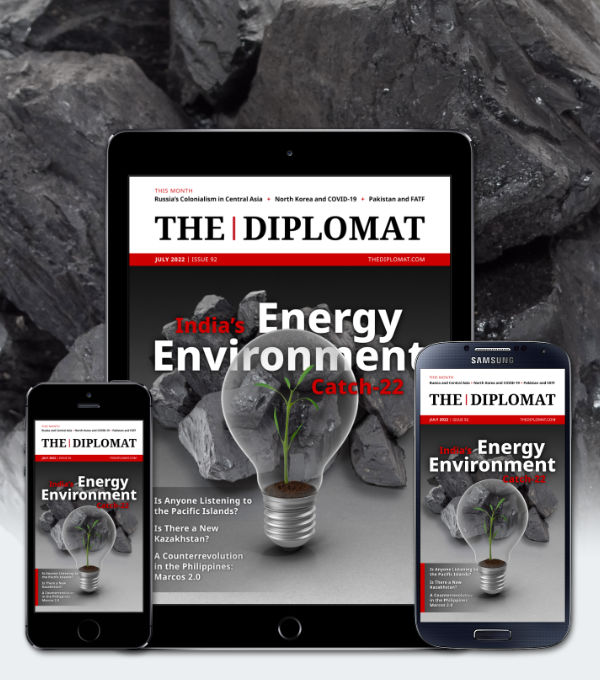| Welcome to the latest issue of Diplomat Brief. This week our top story explores how Russia’s invasion of Ukraine – and the resulting sanctions on Moscow – are rerouting Asian trade. We also have an interview with Dr. Ja Ian Chong, associate professor of Political Science at the National University of Singapore, on Singapore’s PM-in-waiting and the country’s transition from the Lee dynasty. |
| Story of the week |  | Economy Russia-Ukraine War: Implications for Asian GeoeconomicsWhat Happened: Since Russia invaded Ukraine in February 2022, Moscow has been hit with unprecedented sanctions, effectively cutting it off from Western banks and trade. Meanwhile, the war in Ukraine continues to roil global markets, resulting in higher food and energy prices around the world. These factors are rerouting Asian trade – and Iran stands to benefit. Our Focus: Writing for The Diplomat, Ali Ahmadi outlines “interrelated and intersecting trends brought about by the Russian invasion of Ukraine and the unprecedentedly fast succession of Western sanctions imposed on Moscow, which redrew trade maps in Asia.” First, the established overland trade route from China to Europe – which transited Russia – has become riskier, due to both direct security concerns and the sanctions on Russia. Seeking alternative routes, South and Central Asian countries (and Russia itself) are looking to Iran – and the incentives may finally be high enough to risk doing business with Tehran despite its own tranche of Western sanctions. The International North-South Transport Corridor, which transits the Caucuses to link Russia and Central Asia to Iran’s Gulf ports, in particular has seen renewed attention. What Comes Next: “If the increased need of many Asian countries and Russia results in an expansion of financing and usage of these various trade routes, Iran could become a major global trade hub,” Ahmadi writes. “Especially if the current talks result in a resumption of sanctions relief under a reconstituted Iran nuclear deal, investment and trade interest would likely expand dramatically.” Iran’s role in regional trade remains uncertain, but the Raisi administration seems determined to make the most of the favorable geopolitical winds. Read this story |
| Behind the News | INTERVIEW Ja Ian ChongDr. Ja Ian Chong, associate professor of Political Science at the National University of Singapore, on the man tipped to be Singapore’s bridge to a post-Lee dynasty era: “Little is publicly known about Lawrence Wong’s own political proclivities… Like other PAP politicians of his generation, Wong is not associated with any major policy initiative or key political ideas.” Read the interview |
| This Week in Asia | Northeast Asia China, Japan, South Korea FMs Head to Indonesia for G-20 MeetChina’s Wang Yi, Japan’s Hayashi Yoshimasa, and South Korea’s Park Jin will all converge in Indonesia on July 6 and 7 to attend the G-20 foreign ministers’ meeting. While Russia’s invasion of Ukraine – on which the Northeast Asian countries have starkly different views – is likely to dominate the agenda, given tensions between China, Japan, and South Korea it’s also very much worth watching what bilateral meetings manifest on the sidelines. Find out more | South Asia Bangladesh Celebrates Padma BridgeIn late June, Bangladesh formally opened a multipurpose bridge over the Padma River, connecting Dhaka with the less developed region in Bangladesh’s southwest. Built entirely with Bangladeshi funding after the World Bank pulled out, the $3.8 billion project was seen as a long-shot by many, and its completion marks a major political win for the Hasina administration. Find out more | Southeast Asia Chinese FM Embarks on Regional Diplomatic TourChina’s Foreign Minister Wang Yi isn’t only visiting Indonesia this week. His tour of Southeast Asia will take him to five nations. Wang’s swing began with a Lancang-Mekong Cooperation meeting in Myanmar, where he became the highest-ranking Chinese official to visit the country since last February’s coup and pledged to build a “closer relationship” with the country’s military government. He will then attend the G-20 Foreign Ministers’ Meeting in Bali on July 6-7, before making stops in Thailand, the Philippines, and Malaysia, in a bid to counter the United States’ recent diplomatic and economic outreach in the region. Find out more | Central Asia More Unrest in Central Asia: This Time Trouble in KarakalpakstanOver the weekend, protests erupted in Karakalpakstan, an autonomous republic in Uzbekistan whose sovereignty (and the right to secede) is enshrined in the Uzbek Constitution. President Mirziyoyev's proposed constitutional changes would have stripped that status, triggering the protests. An internet blackout makes verifying details of what happened difficult, but there’s a bigger picture: Why so many protests in Central Asia this year? What do they have in common? Find out more |
| Visualizing APAC |  | Turkmenistan’s GDP grew steadily from 2000-2014, but its economy has struggled since then. See the full picture |
| Word of the Week | Politics PaniniraFilipino for “defamation” or a “smear campaign,” a term used by Marcos Jr.’s successful presidential campaign to dismiss any criticism of the family’s authoritarian past. Find out more |
| In Case You Missed It | The Diplomat Asks What Do the Pacific Island Countries Think About China?Last week, The Diplomat hosted a webinar discussing what the Pacific Island countries want from their relationships with China, and what concerns they have about Beijing. You can check out the recording, featuring Dr. Henry Ivarature, a Pacific Policy Fellow at Australia Pacific Security College, Australian National University; Lice Movono, a Pacific correspondent for ABC, The Guardian, and RNZ based in Suva, Fiji; and Dr. Patricia O’Brien, a faculty member in Asian Studies at Georgetown University and in the Department of Pacific Affairs, Australian National University. Watch the webinar |
|  |




